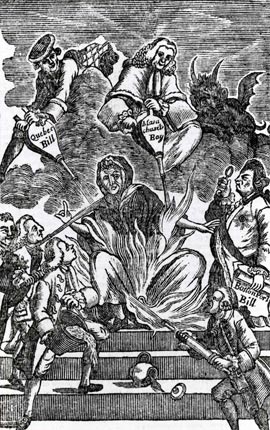Declaring Independence Boston Tea Party
Boston Tea Party
(December 16, 1773)
After the arrival of the first tea ship, the Dartmouth, on 27 November, a series of mass meetings in Boston resulted in demands that the duty should not be paid and that the tea be shipped back. Governor Hutchinson ordered such gatherings to disperse, but the people refused. Meanwhile the Dartmouth entered at the customs house and was subject to seizure if the duties were not paid within twenty days. On December 16, people began pouring into Boston by the hundreds to attend a mass meeting. The consignee of the tea on the Dartmouth was willing to return the cargo, but Governor Hurchinson refused a permit and ordered warships in the harbor to prevent the ship from sailing. His effort was courageous but futile. When the mass meeting heard the report, Samuel Adams arose and declared: "This meeting can do no more to save the country." What followed is described in the newspaper report.
Just before the dissolution of the meeting, a number of brave and resolute men, dressed in the Indian manner, approached near the door of the Assembly, gave the war whoop, which rang through the house and was answered by some in the galleries, but silence being commanded, and a peaceable deportment was again enjoined till the dissolution. The Indians, as they were then called, repaired to the wharf where the ships lay that had the tea on board, and were followed by hundreds of people to see the event of the transactions of those who made so grotesque an appearance.
They, the Indians, immediately repaired on board Captain Hall's ship, where they hoisted out the chests of tea, and when upon deck stove the chests and emptied the tea overboard; having cleared this ship they proceeded to Captain Bruce's and then to Captain Coffin's brig. They applied themselves so dexterously to the destruction of this commodity that in the space of three hours they broke up 342 chests, which was the whole number in those vessels, and discharged the contents into the dock. When the tide rose it floated the broken chests and the tea insomuch that the surface of the water was filled therewith a considerable way from the south part of the town to Dorchester Neck, and lodged on the shores. There was the greatest care taken to prevent the tea from being purloined by the populace. One or two, being detected in endeavouring to pocket a small quantity, were stripped of their acquisitions and very roughly handled.
It is worthy of remark that although a considerable quantity of goods were still remaining on board the vessels, no injury was sustained. Such attention to private property was observed that a small padlock belonging to the captain of one of the ships being broke, another was procured and sent to him. The town was very quiet during the whole evening and night following. Those persons who were from the country returned with a merry heart; and the next day joy appeared in almost every countenance, some on occasion of the destruction of the tea, others on account of the quietness with which it was effected. One of the Monday's papers says that the masters and owners are well pleased that their ships are thus cleared.
(Massachusetts Gazette and Boston Weekly News-Letter, December 23, 1773)
